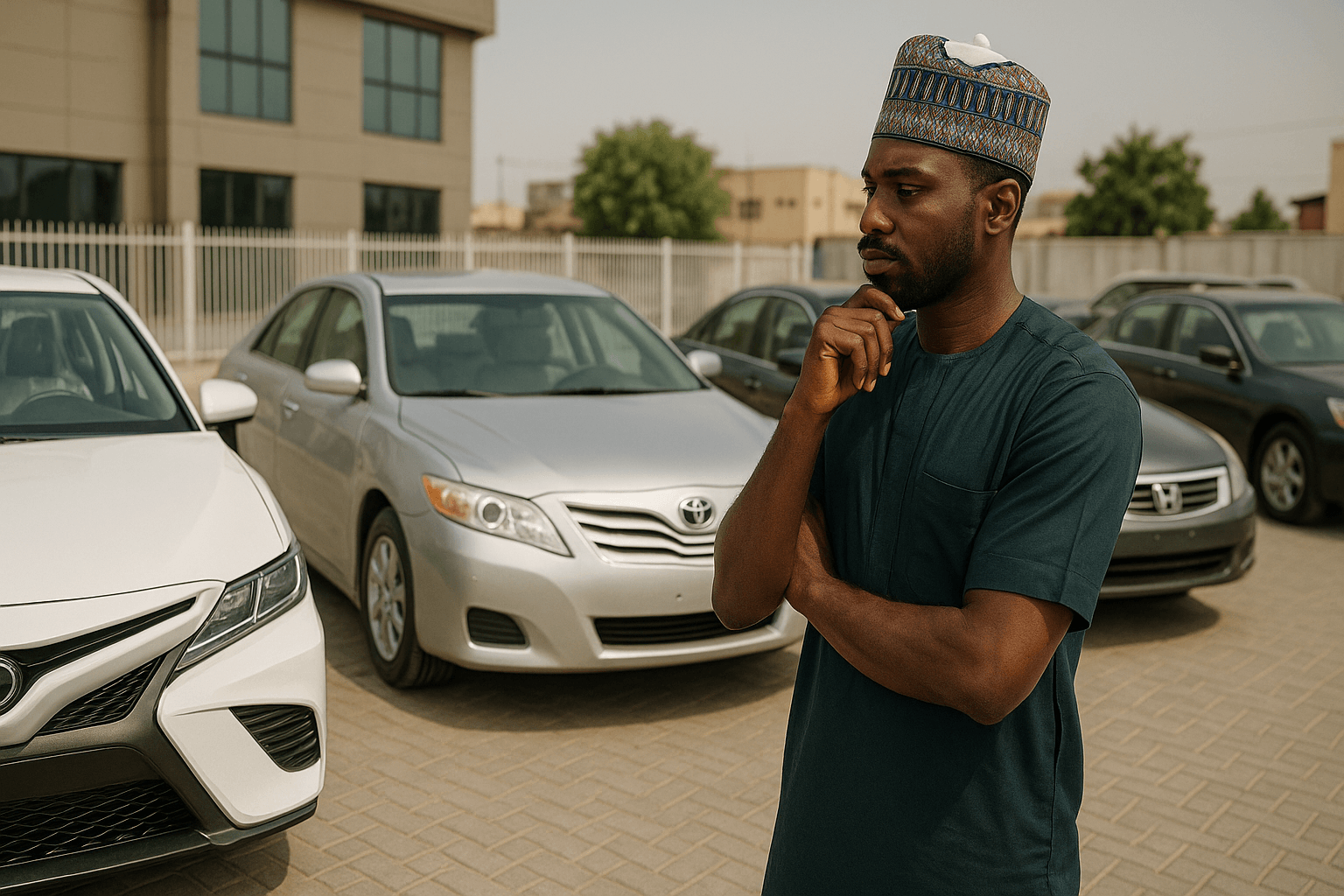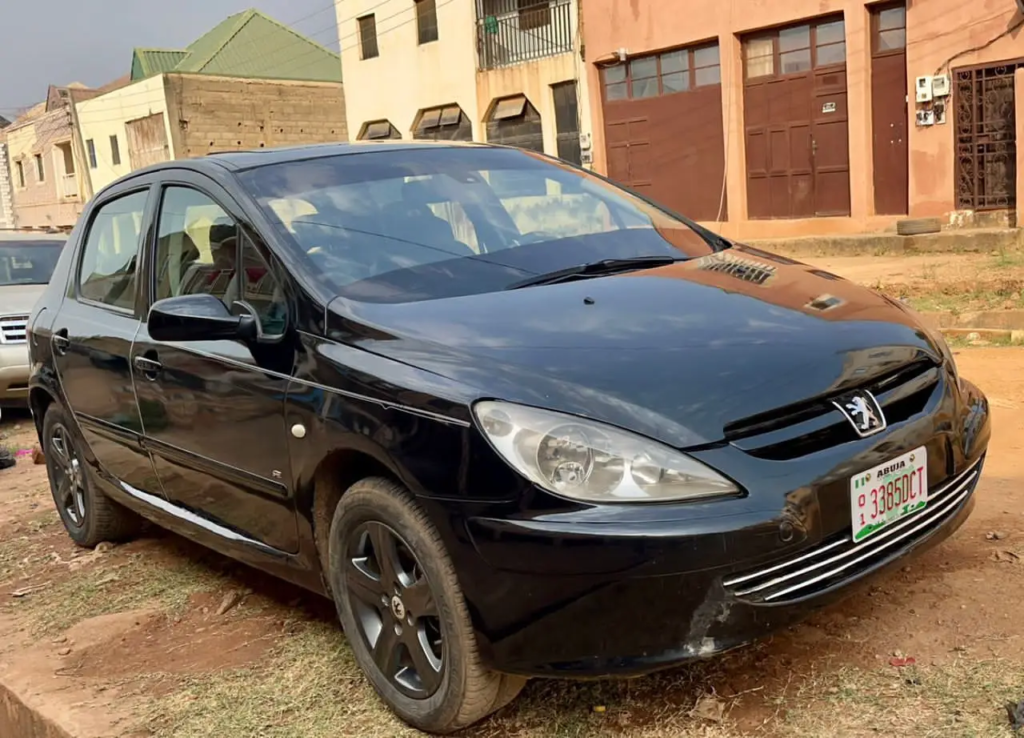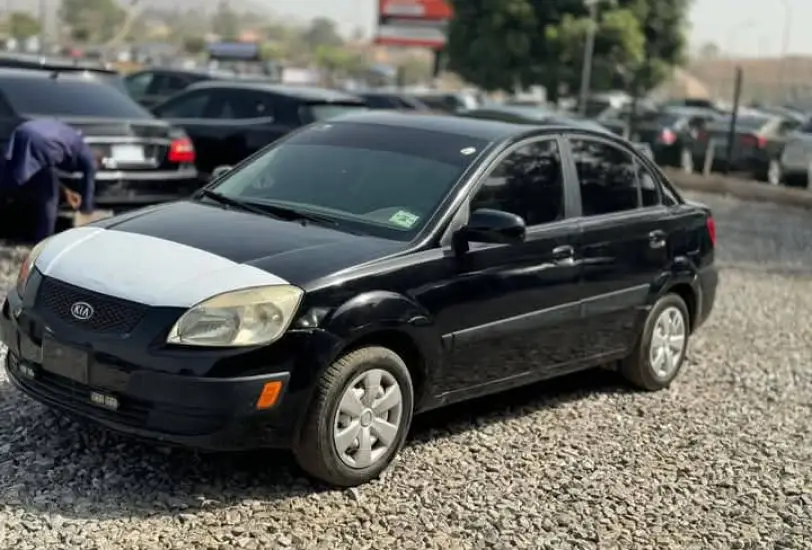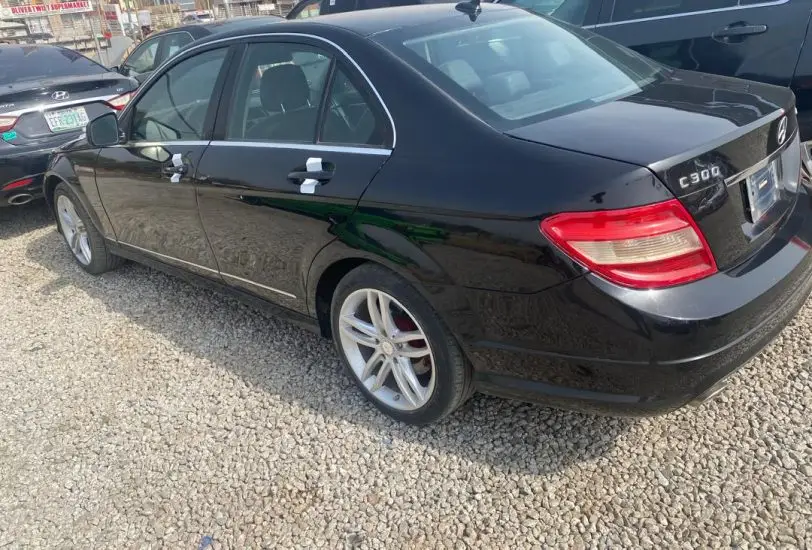The decision to buy a car in Nigeria is a significant milestone, a rite of passage that signals both personal progress and practical necessity. But before you can even think about the make or model, you are faced with a foundational choice that will impact your finances, your peace of mind, and your driving experience for years to come: should you buy a Tokunbo (Foreign Used), a Nigerian Used, or a Brand New vehicle?
This isn’t just a simple question of old versus new; it’s a complex decision with deep financial and practical implications in our unique market. Do you opt for the perceived safety and warranty of a brand-new car at a premium price? Do you choose the incredible value and “first-grade” condition of a Tokunbo (foreign used) car? Or do you go for the upfront affordability of a Nigerian-used vehicle, accepting the potential risks that come with it?
Navigating this choice can be confusing. This guide is here to eliminate that confusion. We will dissect every aspect of this critical decision, using data-driven insights and real-world experience tailored for the Nigerian buyer. We will explore the pros and cons of each option, analyze the long-term costs, and give you the expert knowledge you need to choose the absolute best car for your budget and lifestyle. This is the only guide you’ll ever need on this topic.
Understanding the Core Differences: Tokunbo vs. Nigerian Used vs. Brand New
To begin, we must clearly define our terms, as they form the basis of the entire Nigerian car market.
- Tokunbo (Foreign Used): The term “Tokunbo” is a Yoruba phrase meaning “from overseas.” It refers specifically to a vehicle that was used in a foreign country (typically the USA, Canada, or Germany) and then imported into Nigeria for resale. These cars are highly sought after because they are perceived to have been driven on better roads and subjected to more consistent maintenance practices in their countries of origin before their arrival.
- Nigerian Used: This refers to any vehicle that has already had at least one owner in Nigeria and has been driven on local roads. This includes cars that were originally imported as Tokunbo and are now being resold, or cars that were bought brand new in Nigeria and are now in the second-hand market.
- Brand New: This is a vehicle purchased directly from an authorized dealership in Nigeria with zero mileage and a full manufacturer’s warranty. The primary challenge, as highlighted by the Managing Director of Toyota Nigeria Limited, is that persistent inflation and foreign exchange volatility have made new vehicles prohibitively expensive for most private buyers and the middle class.
The choice between these three options involves a critical trade-off between initial cost, potential risk, and long-term value.
Pros & Cons Comparison of Vehicle Conditions
| Vehicle Condition | Pros | Cons |
| Tokunbo (Foreign Used) | – Superior Initial Condition: Generally benefits from better roads and more stringent maintenance culture abroad. – Higher Specifications: Often comes with more advanced features than the base models sold locally. – Exceptional Value: Offers a modern vehicle experience for a fraction of the brand-new cost. | – Higher Upfront Cost: More expensive than Nigerian Used due to import duties and shipping. – Hidden History Risk: Potential for undiscovered flood or accident damage from its country of origin if not properly verified with a VIN check. – Forex Dependent: The final price is directly tied to the fluctuating Dollar-to-Naira exchange rate. |
| Nigerian Used | – Maximum Affordability: The most budget-friendly option to get on the road. – No Customs Hassle: All import duties and clearing costs are already settled. – Potentially Known History: You may be able to speak with the previous owner directly. | – Significant Wear & Tear: Has endured the rigors of Nigerian roads, traffic, and fuel quality. – Inconsistent Maintenance: Service history is often patchy, undocumented, or completely unknown, reflecting a “reactive rather than preventative maintenance” culture. – High “Wahala” Risk: Greater probability of underlying mechanical issues being cleverly disguised. |
| Brand New | – Manufacturer’s Warranty: Complete peace of mind for the first few years. – Pristine Condition: Zero mileage, no prior wear, and the latest technology. – No Hidden Surprises: You are the first and only owner. | – Prohibitive Cost: Can be two to four times the price of a comparable Tokunbo model. – Rapid Depreciation: Loses a substantial portion of its value the moment it is registered and driven off the lot. |
For a full breakdown of these pros and cons, read our detailed guide: [The Pros & Cons of Buying Tokunbo Cars]. And to better understand the local market, see our [The Guide to Buying Nigerian Used Cars].
Is Buying a Brand New Car in Nigeria Worth It? The Financial Reality
The allure of a brand-new car is undeniable. However, the financial reality in Nigeria makes it a challenging proposition for most. The primary factor to consider is depreciation, which is the rate at which an asset loses its value over time. For new cars, this loss is most severe in the first few years of ownership.
A new vehicle can lose 20-30% of its value in the first year alone and up to 50% or more within the first three years. This means a car bought for ₦30 million could be worth only ₦15 million after three years, a staggering loss of ₦15 million. In contrast, a 5-year-old Tokunbo car has already experienced the majority of its steepest depreciation in a foreign market. Its value in Nigeria will decline at a much slower, more stable rate, making it a far superior financial asset for most people.
Unless the absolute peace of mind of a manufacturer’s warranty outweighs the certainty of massive depreciation, a brand-new car is often not the most financially prudent choice in the Nigerian context.
Illustrative Depreciation Curve – Brand New Car vs. Tokunbo Vehicle (First 3 Years in Nigeria)
(Disclaimer: This table is illustrative, based on general automotive depreciation principles and inferences. Actual rates vary by make, model, market conditions, and vehicle condition.)
| Year | Brand New Car (Estimated % of Original Value Remaining) | Tokunbo Car (5-year-old model, Estimated % of its Purchase Value Remaining) |
| Purchase | 100% | 100% (of its Tokunbo purchase price) |
| End of Year 1 | 70% – 80% | 90% – 95% |
| End of Year 2 | 55% – 65% | 80% – 85% |
| End of Year 3 | 45% – 55% | 70% – 75% |
Get the full financial breakdown in our guide: [Is Buying a Brand New Car in Nigeria Worth It?]
The Riskiest Game: Understanding Salvage and Accident Cars
In your search for a bargain, you will inevitably encounter deals that seem too good to be true. A 2016 model priced like a 2013 model is a major red flag, and often, the reason is a compromised vehicle history. It’s crucial to understand this terminology to protect yourself.
- Salvage Title: This is a title given to a vehicle that has been deemed a total loss by an insurance company in its country of origin due to an accident, flood, fire, or theft.
- Rebuilt Title: This is a salvage vehicle that has been repaired and has passed a basic safety inspection to be legally drivable again.
- Flood-Damaged Car/Title: This refers to a vehicle that has been submerged in water to a level causing significant damage, particularly to the engine, transmission, electrical systems, and interior. In many jurisdictions, severely flood-damaged cars are issued salvage titles.
While salvage cars are cheap, they come with immense risks. They may have irreparable frame damage that affects alignment and safety, persistent and nightmarish electrical problems from flood damage, or shoddy repairs hidden under a shiny coat of paint. Unless you are an expert mechanic yourself, buying a salvage or rebuilt car is a massive gamble that is not recommended.
To learn how to protect yourself, read our critical guide: [Understanding Salvage & Accident Cars].
The Cost of Ownership: A Head-to-Head Financial Comparison
The real cost of a car isn’t what you pay for it; it’s what you pay to keep it on the road. This is where the battle between a good Tokunbo and a typical Nigerian Used car becomes clear.
| Cost Factor | Well-Maintained Tokunbo | Typical Nigerian Used | The Expert Take |
| Initial Purchase Price | Higher | Lower | The Nigerian Used car is cheaper to buy initially. |
| Immediate Repairs (First 3 Months) | Lower (e.g., new tyres, full service) | High (Potential for major fixes like transmission, engine gaskets, suspension overhaul) | The initial savings on a Nigerian Used car are often wiped out by immediate, necessary repairs. |
| Long-Term Reliability (Years 1-3) | Higher (if maintained proactively) | Lower (problems are more likely to reoccur) | A well-maintained Tokunbo car provides more predictable running costs and fewer surprise breakdowns. |
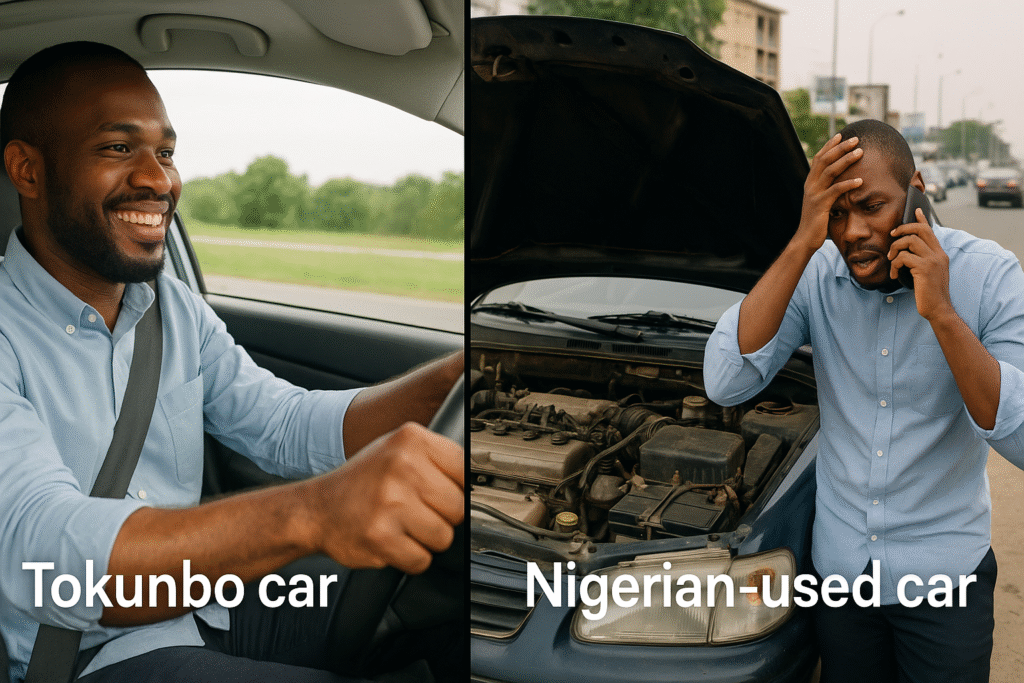
While a Nigerian-used car might be ₦1-2 million cheaper upfront, if it requires an immediate ₦800,000 transmission repair and a ₦500,000 suspension overhaul within the first six months, you’ve already lost your initial savings and are left with a less reliable vehicle. A good Tokunbo car, while more expensive initially, often requires only standard preventative maintenance, making it cheaper to own over the long run.
See the detailed cost analysis in our full guide: [Maintenance Costs: Tokunbo vs. Nigerian Used].
The Buyer’s Eye: How to Spot a Good Car from a Bad One
Developing a keen eye for potential problems is a skill that can save you millions. You must learn to look beyond the shiny paint.
How to Spot a Flood-Damaged or Accident Car
This is a critical skill when inspecting any Tokunbo vehicle.
- Red Flags for Flood Damage: Your nose is your best tool. A persistent musty, damp, or moldy smell inside the cabin is the biggest giveaway. Don’t trust a seller who says “it just needs airing out.” Lift the floor mats and feel for dampness or look for silt under the carpet. Check for rust on the seat bolts and other interior metal parts that shouldn’t have it.
- Telltale Signs of a Major Accident: Look for uneven gaps between body panels (e.g., between the door and the fender). View the car in bright sunlight and look for mismatched paint shades between panels. A wavy or “orange peel” texture in the paint indicates a repaint. Open and close all doors, the bonnet, and the trunk to ensure they align properly.
Master the art of inspection with our guide on [How to Spot a Flood-Damaged or Accident Car].
“First Body”: Decoding Nigerian Car Terminology
In the Nigerian market, the term “First Body” is golden. It means the car still has its original factory paint and has not been involved in any accident that required bodywork and repainting. It’s the highest stamp of approval for a used car’s condition and significantly impacts its resale value. A car that is not “first body” isn’t necessarily a bad car if it was repaired professionally, but it should be priced significantly lower than one with its original paint intact.
Learn the local lingo in [“First Body”: Decoding Nigerian Car Terminology].
Key Takeaways
- For the Best Overall Value, Choose Tokunbo. A well-chosen Tokunbo car offers a smart balance, providing a more reliable vehicle with higher specifications than a Nigerian-used car for a fraction of the cost of a brand new one.
- Approach Nigerian Used with Extreme Caution. While the upfront price is the lowest, these cars have been subjected to harsh local roads and often have an inconsistent maintenance history, reflecting a “reactive rather than preventative maintenance” culture that can lead to costly repairs.
- Buy Brand New for Warranty, Not for Value. A new car offers complete peace of mind but suffers from massive financial depreciation the moment it is driven off the lot. In Nigeria’s economic climate, this often makes it a less financially prudent choice.
- A Professional Inspection is Non-Negotiable. Regardless of the car’s condition, a thorough pre-purchase inspection and a Vehicle Identification Number (VIN) check are essential to uncover hidden issues like accident history or flood damage and to verify the vehicle’s history.
- Your Final Decision is a Strategic Trade-Off. The best choice depends entirely on your personal priority: the absolute lowest upfront cost (Nigerian Used), the best long-term value (Tokunbo), or the ultimate peace of mind (Brand New).
Conclusion: Making the Smartest Choice for Your Wallet and Your Peace of Mind
The choice between Brand New, Tokunbo, and Nigerian Used is not just about price; it’s about value, risk, and long-term satisfaction. To make the best decision, you must first assess your own priorities.
- Buy Brand New if: Your budget is substantial, and the peace of mind of a multi-year manufacturer’s warranty is your absolute highest priority above all else.
- Buy Tokunbo if: You are like most Nigerians and want the best possible balance of value, reliability, and modern features. A properly inspected Tokunbo car is, for most people, the smartest financial decision.
- Buy Nigerian Used if: Your upfront budget is extremely tight, and you have access to a deeply trusted and highly skilled mechanic who can exhaustively vet the vehicle before you commit a single Naira.
At Autokunbo.com, we specialize in providing the best of both worlds: the incredible value of a Tokunbo car with the peace of mind you deserve. Every vehicle in our inventory comes with a comprehensive inspection report, verified documentation, and a quality guarantee. Make the smart choice today.


